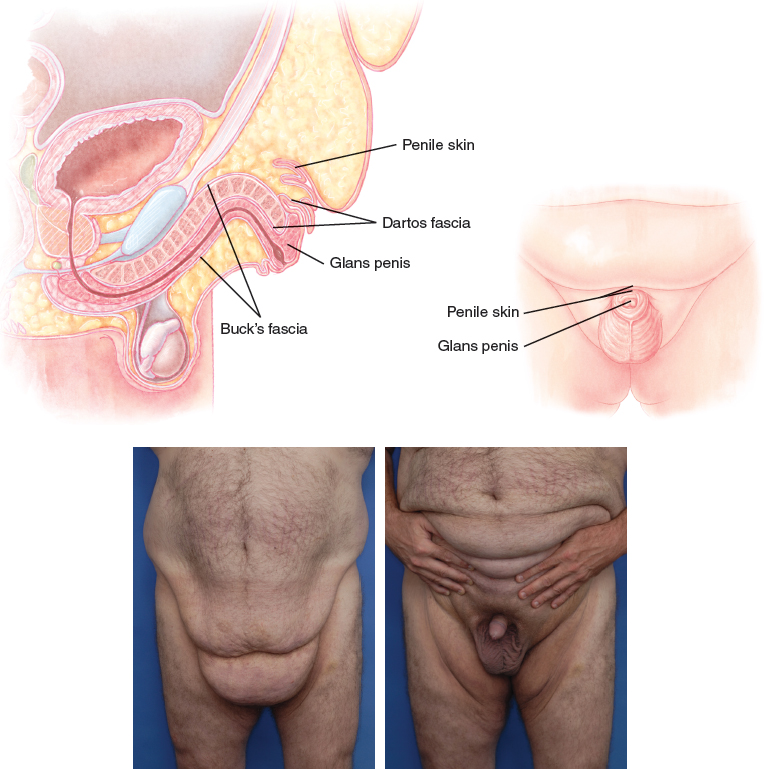
A buried penis occurs when an otherwise normal-sized phallus becomes obscured by excess skin and fat in the pubic region, obscuring it completely and leading to issues with urination and sexual function - as well as having a detrimental impact on self-image in boys and men.
Buried penis may be present from birth or acquired later through infection, injury, obesity, inflammation or surgery. Treatment can greatly help ease both physical and psychological aspects associated with this condition.
Buried penis occurs when the penis becomes covered by skin or fat and becomes submerged beneath its surroundings, either congenitally or as an adult condition such as obesity, radical circumcision or penoscrotal lymphedema. Although not very common, this condition can have serious repercussions for quality of life for those affected.
Buried or scrotal peniss can lead to problems with urination and sexual function in boys and men alike, including urinary tract infection due to moisture being trapped within it, as well as increasing chances of erectile dysfunction or sexually transmitted diseases.
Treatment options for buried or scrotal penis will depend on its source; for instance, weight loss and diet changes may help. Otherwise, surgical solutions are usually necessary.
Buried penis can present males of all ages with difficulty when it comes to urination. Urine may irritate skin irritation or infections such as balanitis. Furthermore, this condition makes erections difficult; many sufferers report experiencing depression and low self-esteem as a result of its effects on their appearance and sexual function.
Doctors can identify buried penis by performing a physical exam on the patient. He or she should stand and sit, with special attention paid to any skin changes such as whitening or glans fusion or changes to the size or prepuce; additionally, their abdomen should be examined for signs of fat deposition in central and suprapubic regions which could contribute to obesity-induced penis burying.
Treatment options available to adults for their buried peniss include steroid creams and surgery. Post-operation, skin grafts from their thighs are usually applied over the area to cover it up and conceal its location.
Some children born with buried penis may outgrow it with age, but most patients require surgery to remove the extra tissue. Surgery for adults usually aims to address issues related to urination while it may also treat conditions like genital lymphedema and lichen sclerosus.
An overhanging skin creates a moist environment that facilitates infection of the urinary tract and genital area, which may result in difficulty with urination as well as dribbling or incontinence in uncircumcised men; additionally, having an uncircumcised penis may impair sexual function and lead to psychological symptoms like depression and low self-esteem.
Adults with buried penis often also suffer from significant underlying scrotal and pelvic lymphedema that must also be addressed. Treatment options available to them include phalloplasty, scrotoplasty, STSG (Split Thickness Skin Grafting), which has shown promising results regarding penile length and functional outcomes; further study will likely be required however.
A buried penis is a condition in which the person's phallus becomes hidden behind skin and fat, either at birth or later on. People living with this condition experience problems related to aesthetic appearance, hygiene, voiding function and sexual satisfaction.
Infants and small children typically develop buried penis due to issues with the ligaments that support and hold up their penis when in an upright position, but adult men who are overweight, have congenital defects, or medical conditions like lichen sclerosus or penoscrotal lymphedema may also experience this complication.
Obesity is often the source of an adult male's buried penis; however, other causes could include laxity in connective tissue, hidradenitis suppurativa, lichen sclerosus or complications from surgery for penile or scrotal enlargement or infections as well. Therefore, it's wise to discuss your concerns with a healthcare provider in order to identify effective treatment solutions tailored specifically to you.